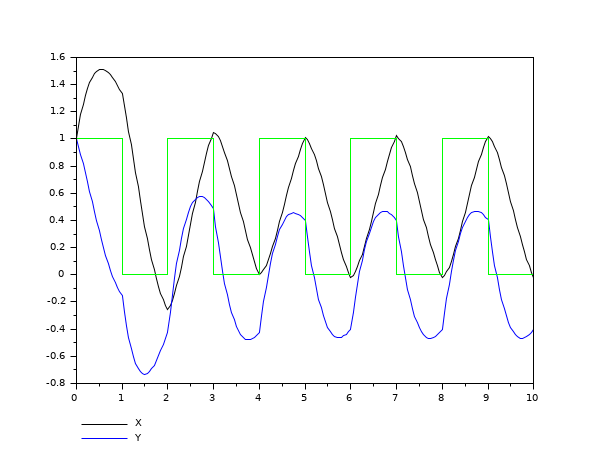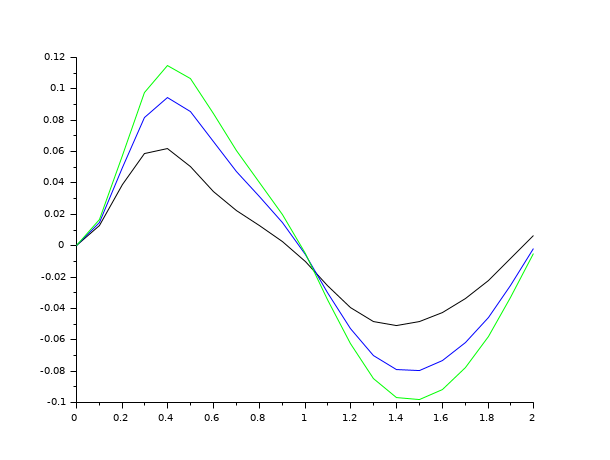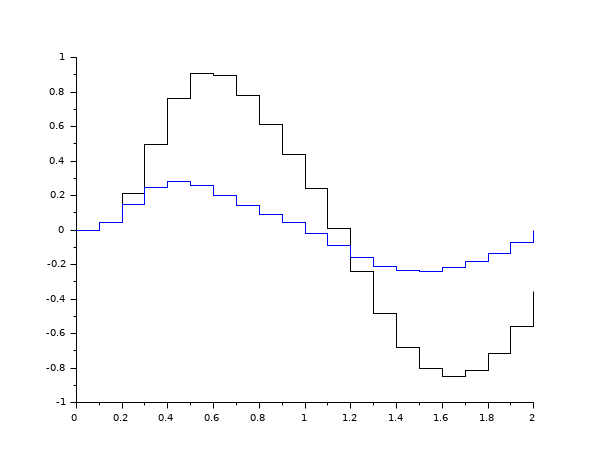Please note that the recommended version of Scilab is 2026.0.1. This page might be outdated.
See the recommended documentation of this function
odedc
discrete/continuous ode solver
Syntax
yt = odedc(y0, nd, stdel, t0, t, f)
Arguments
- y0
a real column vector (initial conditions),
y0=[y0c;y0d]wherey0dhasndcomponents.- nd
an integer, dimension of
y0d- stdel
a real vector with one or two entries,
stdel=[h, delta](withdelta=0as default value).- t0
a real scalar (initial time).
- t
a real (row) vector, instants where
ytis calculated.- f
an external i.e. a function or a character string or a list with syntax:
yp = f(t,yc,yd,flag).- f
an external i.e. a function or a character string or a list with syntax:
yp = f(t,yc,yd,flag)- a list
This form of external is used to pass parameters to the function. It must be as follows:
list(f, p1, p2,...)
where the syntax of the function
fis nowyp = f(t, yc, yd, flag, p1, p2,...)
fstill returns the function value as a function of(t, yc, yd, flag, p1, p2,...), andp1, p2,...are function parameters.- a character string
it must refer to the name of a C or fortran routine, assuming that <
f_name> is the given name.The Fortran calling sequence must be
<f_name>(iflag, nc, nd, t, y, ydp)double precision t, y(*), ydp(*)integer iflag, nc, ndThe C syntax must be
void <f_name> (int *iflag, int *nc, int *nd, double *t, double *y, double *ydp)
In both Fortran and C cases, the input arguments are:
iflag=0or1nc= number of continuous statesycnd= number of discrete statesydt= timey=[yc; yd; param]. param may be used to get extra arguments which have been given in the odedc call(y = odedc([y0c; y0d], nd, stdel, t0, t, list('fexcd', param)))As output
ydp, the routine must computeydp[0:nc-1] = d/dt ( yc(t) )foriflag=0andydp[0:nd-1] = yd(t+)foriflag=1.
Description
y = odedc([y0c;y0d], nd, [h,delta], t0, t, f) computes
the solution of a mixed discrete/continuous system. The discrete system
state ydk is embedded into a piecewise constant
yd(t) time function as follows:
yd(t) = ydk for t in
[tk = h*(delta+k) , tk+1 = h*(delta+k+1) ).
The simulated equations are now, for t in [ tk , tk+1 ):
dyc/dt = f(t, yc(t), yd(t), 0) yc(t0) = y0c
and at instants tk the discrete variable
yd is updated by
yd(tk+)
= f(yc(tk-), yd(tk-), 1).
Note that, using the definition of yd(t) the last
equation gives
ydk
= f(tk, yc(tk-), yd(tk-1), 1)
(yc is time-continuous:
yc(tk-) = yc(tk)).
The calling parameters of f are fixed:
ycd = f(t,yc,yd,flag); this function must return either
the derivative of the vector yc if
flag=0 or the update of yd if
flag=1.
ycd = dot(yc) must be a vector with same dimension
as yc if flag=0 and
ycd = update(yd) must be a vector with same dimension as
yd if flag=1.
t is a vector of instants where the solution
y is computed.
y is the vector
y = [y(t(1)), y(t(2)),...].
This function can be called with the same optional parameters as the ode
function (provided nd and stdel are given in
the syntax as second and third parameters). In particular
integration flags, tolerances can be set. Optional parameters can be set
by the odeoptions function.
External routines can be dynamically linked (see link).
Examples
//Linear system with switching input deff('xdu=phis(t,x,u,flag)','if flag==0 then xdu=A*x+B*u; else xdu=1-u;end'); x0=[1;1]; A=[-1,2;-2,-1]; B=[1;2]; u=0; nu=1; stdel=[1,0]; u0=0; t=0:0.05:10; xu=odedc([x0;u0],nu,stdel,0,t,phis); x=xu(1:2,:); u=xu(3,:); nx=2; plot2d(t, x', [1:nx], '161') plot2d2('onn',t',u',[nx+1:nx+nu],'000'); //Fortran external (see fydot2.f): norm(xu-odedc([x0;u0],nu,stdel,0,t,'phis'),1)

//Sampled feedback // // | xcdot=fc(t,xc,u) // (system) | // | y=hc(t,xc) // // // | xd+=fd(xd,y) // (feedback) | // | u=hd(t,xd) // deff('xcd=f(t,xc,xd,iflag)',... ['if iflag==0 then ' ' xcd=fc(t,xc,e(t)-hd(t,xd));' 'else ' ' xcd=fd(xd,hc(t,xc));' 'end']); A=[-10,2,3;4,-10,6;7,8,-10]; B=[1;1;1]; C=[1,1,1]; Ad=[1/2,1;0,1/20]; Bd=[1;1]; Cd=[1,1]; deff('st=e(t)','st=sin(3*t)') deff('xdot=fc(t,x,u)','xdot=A*x+B*u') deff('y=hc(t,x)','y=C*x') deff('xp=fd(x,y)','xp=Ad*x + Bd*y') deff('u=hd(t,x)','u=Cd*x') h=0.1;t0=0;t=0:0.1:2; x0c=[0;0;0]; x0d=[0;0]; nd=2; xcd=odedc([x0c;x0d],nd,h,t0,t,f); norm(xcd-odedc([x0c;x0d],nd,h,t0,t,'fcd1')) // Fast calculation (see fydot2.f) plot2d([t',t',t'],xcd(1:3,:)'); scf(2); plot2d2("gnn",[t',t'],xcd(4:5,:)'); scf(0);


See also
- ode — solveur d'équations différentielles ordinaires
- link — dynamic linker
- odeoptions — set options for ode solvers
- csim — simulation (time response) of linear system
- external — Objet Scilab, fonction externe ou routine
| Report an issue | ||
| << ode_root | Intégration - dérivation | odeoptions >> |